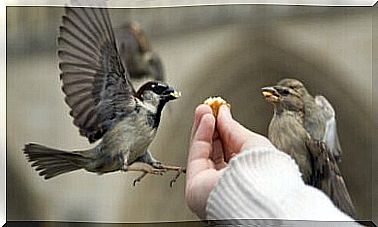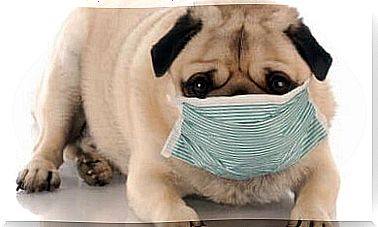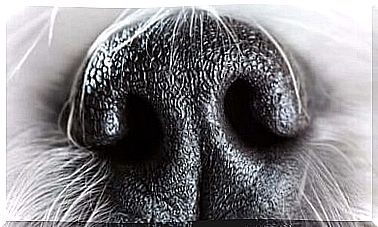The Benefits Of Honey For Your Dog

Many wonder if dogs can be offered honey. As it is a natural product, it would not be toxic to pets, but it all depends on the amount we offer and when they consume it. In this article, we’ll tell you about the benefits of honey for your dog.
Honey for your dog: yes or no?
If we get straight to the point, the truth is that a dog doesn’t need honey to survive. This food is a carbohydrate that could even be avoided from a carnivore’s diet. But that doesn’t mean that it’s forbidden or that it’s bad for him, even a little vegetable-based hydrates wouldn’t be bad for his diet.

The problem of giving or not honey to your dog lies in the fact of its use. This means that, although it doesn’t do any harm, it shouldn’t be part of the dog’s usual diet. And if, in addition, we add the fact that the honey we buy in the market is extracted through heat and not cold, it would not be entirely advisable to offer honey to our pet.
Under this manufacturing process, many of honey’s natural properties are lost, and what we are actually giving the animal is “commercial” sugars and carbohydrates. Although, of course, refined sugar is not the best option, we must be careful with the amount of honey our dog ingests.
The honey in the dog’s usual food
Veterinarians recommend this food in specific situations such as, for example, a hypoglycemic crisis, since it is a source of energy with fast access. In addition, it can be offered to hunting dogs or dogs that perform a lot of physical activity. However, there are other options more suitable for the animal: fresh and natural products suitable for pets and with medium or high levels of fat.
It’s not bad for a dog to consume honey; but as long as it doesn’t become part of his usual diet. It’s a good idea to serve as an occasional prize (grease a little bit of bread or biscuit). As it is a food rich in minerals, vitamins and antioxidants, it can be present in some cakes for dogs, which we can give as a reward from time to time.
It must be known that dogs cannot consume honey without exception. Because? Because it contains a type of bacteria called C lostridium botulinum, which produces a neurotoxin in the intestine and affects both the digestive and nervous systems.
These bacteria can only leave their negative mark when the pet is less than 18 months old. When this period has passed, the immune system has already strengthened and has the ability to block infectious agents or trigger certain defenses.
How much honey to give my dog? It all depends on his weight:
- Between 14 and 18 kg: ½ spoon per week.
- Between 20 and 28 kg: 1 teaspoon per week.
- Between 30 and 38 kg: 1 and ½ teaspoon per week.
Pay close attention the first time you give your dog honey, as he may be allergic. In that case, he will vomit and have diarrhea, be downcast, or suffer a severe itching attack. If that happens, you should eliminate honey from his diet.
Healing Effects of Honey on Dogs
If you have already found that your dog is allergic to honey and you want to offer it to him, considering the doses according to his weight, you might be interested in knowing what are the benefits of these foods for dogs:
Reduces pollen allergy

If your pet has this problem (or contamination can affect it), honey can help reduce symptoms. The fact that it already has pollen particles makes the honey help the animal to immunize itself against the pollen. That way, every time you go out into the street or park, you won’t be sneezing.
cures cough
As with people, we can give the dog honey to relieve sore throats and phlegm.
If he’s already been injured in a fight or a joke, you can smear the wound with a little honey. Since he will lick it, there will be no intoxication problems. This food has many antibiotic and antiseptic properties.
Reduces gastritis problems
If your dog suffers from indigestion, colic or gastritis, you can give him some honey. Thanks to its antibacterial properties, it will control the growth of these microorganisms in the animal’s stomach or intestine.









